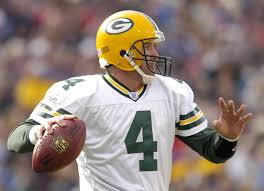In the annals of NFL history, certain players are remembered not just for their stats, but for the spirit they brought to the game. Brett Favre was one of those players. A fearless competitor with a rocket arm, iron will, and boyish love for the sport, Favre brought a unique style of quarterbacking that helped shape the modern NFL.
He didn’t just break records he broke the mold.
From Southern Roots to NFL Greatness
Hailing from Kiln, Mississippi, Brett Favre played college ball at Southern Miss, a school not exactly known as a quarterback factory. But Favre had something scouts couldn’t measure heart, grit, and a cannon for an arm.
Drafted by the Atlanta Falcons in 1991, Favre was nearly buried on the depth chart. But a trade to the Green Bay Packers in 1992 changed everything not just for him, but for the entire franchise. Green Bay, once a storied team that had fallen into irrelevance, was about to find its new face.
The Ironman Emerges
Favre didn’t take long to make an impact. In his first season with the Packers, he came off the bench and led a dramatic comeback win, beginning a starting streak that would become the longest in NFL history for a quarterback 297 consecutive games (321 including playoffs). That streak is a testament not only to his toughness but to his incredible durability in a brutal sport.
Through sprains, fractures, and even the loss of his father, Favre never missed a start. His resilience became part of his legend.
The Gunslinger Mentality
Favre’s playing style was as bold as his personality. He had no fear throwing into tight windows or launching 60-yard bombs on the run. At times, that led to interceptions he retired with the most in NFL history but it also led to some of the most thrilling moments football fans have ever seen.
He didn’t play it safe. He played free.
That unpredictability made him must-watch TV. Whether he was threading the needle in triple coverage or improvising a touchdown pass while falling down, Favre embodied a kind of backyard football magic that made him a fan favorite across the league.
Changing the Quarterback Blueprint
Before Favre, quarterbacks were often seen as cerebral field generals precise, poised, almost robotic. Favre changed that image. He played with emotion, celebrated with childlike joy, and wore his heart on his sleeve. His toughness, playmaking, and leadership paved the way for a new generation of quarterbacks who mixed raw emotion with elite athleticism.
Players like Tony Romo, Ben Roethlisberger, and even Patrick Mahomes have cited Favre as an influence quarterbacks who extend plays, take chances, and bring flair to the position.
Favre also made the quarterback position fun to watch. He proved that charisma, improvisation, and passion could coexist with elite performance.
Statistical Greatness
By the time he retired (for the final time in 2010), Favre had:
- 71,838 passing yards
- 508 touchdown passes
- Three NFL MVP awards (1995–1997) – the only player to win three straight
- One Super Bowl title (XXXI) with the Packers
- 11 Pro Bowl selections
While some of those records have since been broken, Favre was the first to reach many of those milestones, setting a new bar for what was possible from the quarterback position.
A Complicated but Unforgettable Legacy
Favre’s later years included stints with the New York Jets and Minnesota Vikings, where he had a late-career renaissance including a near Super Bowl run with the Vikings in 2009. His willingness to keep playing, even into his 40s, helped normalize the idea that elite quarterbacks could maintain a high level well past the typical retirement age a path followed by Tom Brady and Aaron Rodgers.
Off the field, Favre’s legacy has faced scrutiny in recent years due to legal controversies and personal decisions, which have complicated his public image. Still, on the gridiron, few can deny the joy, courage, and raw energy he brought to the sport.
The Original Gunslinger
Brett Favre didn’t play the game like anyone else. He laughed, he cried, he celebrated, and he threw more touchdowns and interceptions than anyone before him. But what made Favre truly special was how he connected with fans. He reminded us that football is a game, and he played it with the same passion as a kid tossing the ball around in his backyard.
He wasn’t perfect. But he was unforgettable.
And the game will never be quite the same without #4 under center.

